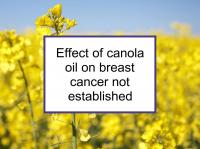The canola plant (Brassica napus) was developed in Canada during the 1970s using selective breeding and hybrid propagation techniques from rapeseed, black mustard, and leaf mustard. Rapeseed is high in erucic acid, an unhealthy fatty acid linked to increased breast cancer risk, but the canola plant was developed to minimize this component.
Canola oil is made from the pressed seed of the canola plant. Canola oil is low in saturated fat and has a high monounsaturated fat content. It contains campesterol, oleic acid, linoleic acid and alpha-linolenic acid (ALA). The oil's ALA content makes it a good source of non-marine omega-3 fatty acids compared to other vegetable oils. Canola oil is also a dietary source of CoQ10, vitamin E and vitamin K.
Canola oil has anti-inflammatory and antioxidant properties. In one study, consumption of canola oil was found to lower LDL-cholesterol and improve endothelial function in subjects with peripheral arterial occlusive disease, indicating that canola oil might provide cardiovascular protection. Canola oil was shown to prevent diabetic renal injury in diabetic rates in another study. Canola meal (which is left over from the seeds after the oil has been extracted) has been shown to reduce the tumor incidence and volume of both melanoma and colon cancer in mice.
However, a 2017 study reported that mice fed a diet supplemented with canola oil showed signs of memory impairment compared to mice on a regular mouse chow diet.
Breast cancer-related effects of consuming canola oil
Canola oil has been shown to inhibit growth and induce apoptosis in both estrogen positive (ER+) and estrogen negative (ER-) human breast cancer cells. Female mammary gland cancer-prone rats consuming canola oil during pregnancy have been found to produce offspring with lower tumor numbers, lower tumor volume and lower percentage of mice with tumors than the offspring of mothers on a diet with equivalent amounts of corn oil.
Several studies have found that higher omega-3/omega-6 fatty acid ratios are associated with reduced risk of breast cancer; using canola oil would tend to improve the ratio for most women. A 2008 San Francisco population study found that women cooking mainly with olive/canola oil have a lower risk of breast cancer than those cooking with vegetable/corn oil or hydrogenated fats.
Additional comments
Frying with canola oil (especially deep frying or wok frying) has been shown to release carcinogenic polycyclic aromatic hydrocarbons (PAHs) in the cooking oil smoke and fumes (this is true of soybean oil, corn oil, peanut oil, and sunflower oil as well). Breathing such fumes should be avoided since this has been associated with increased risk of lung cancer in several population studies.
Mayonnaise made with canola oil is preferable to that made with soybean oil or grape seed oil because of canola oil's more favorable fatty acid profile.
While the canola plant was developed using conventional methods, the majority of current canola production comes from genetically modified plants developed for their resistance to herbicides. Organic canola oil is available for those concerned about consuming genetically modified foods.
Possibly because of its connection with rapeseed oil, canola oil has been the subject of many alarming negative (and false) health-related claims, especially on the internet. As mentioned above, rapeseed oil is high in erucic acid (30 to 60 percent) and should be avoided (canola oil contains between 0.3 and 1.2 percent erucic acid, an acceptable amount). Rapeseed oil normally is not sold in U.S. supermarkets but it can be found as an ingredient in some processed foods such as commercial peanut butter. Be aware that in Europe, canola oil is referred to as rape oil or rapeseed oil but it is, in fact, canola oil.
Below are links to recent studies concerning this food and its components. For a more complete list of studies, please click on canola oil.
